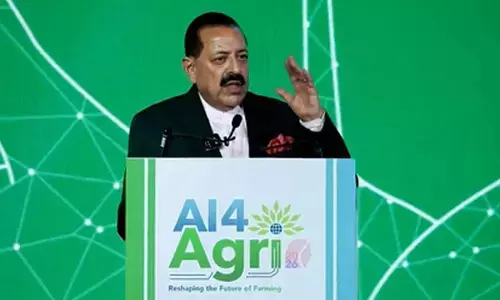Privatisation spree in banking sector

Privatisation spree in banking sector
- There is no smoke without fire. So, there is no point in taking the reports of the Central government's plans to embark on a banking privatisation spree, with a pinch of salt
There is no smoke without fire. So, there is no point in taking the reports of the Central government's plans to embark on a banking privatisation spree, with a pinch of salt.
Several key members of the Modi government made it umpteen times clear that the Centre had 'no business to be in business'. The latest reports of the Centre's move to privatise several public sector banks (PSBs) is an extension of that line of thinking in the Modi-led BJP government. Officials were quoted as saying on Monday that the Central government was not keen on keeping more than four to five banks under its folds. At present, the government owns 12 banks. That means the remaining seven to eight PSBs will go the private sector way. Last year, the Centre merged 10 banks into four, making them larger banks in the process. It also made it clear that there would be no more bank mergers among State-owned banks. So, the plan is to hand over unmerged banks to private players. It is said that the Centre will initially be selling majority stakes in Bank of India, Central Bank of India, Indian Overseas Bank, UCO Bank, Bank of Maharashtra, and Punjab & Sindh Bank. However, privatising PSBs is not as easy as it sounds. The move brings several challenges to the fore. Private banking is expensive.
So, the country's poor can't afford private banking channels. Though RBI mandated private banks to offer no-frills accounts to the poor, the directive is yet to come into reality. Therefore, privatising PSBs will reduce banking options for the disadvantaged. On the operations side, PSBs have their own style of working at a relaxed pace. People employed by PSBs are tuned to it. Will they adapt themselves to the working style in the private sector? Otherwise, there will be huge layoffs post the privatisation. Alternatively, the Centre will have to rehabilitate them in PSBs that will remain under its folds. Further, trade unions are very strong in public sector banking. So, they will leave no stone unturned to stop the privatisation. Moreover, most of PSBs are saddled with a large pile of bad loans. At the end of September last year, bad loans in the banking sector reached Rs 9.35 lakh crore, making up about 9.1 per cent of their assets. These bad loans are estimated to double this fiscal, thanks to Covid-19 crisis. Against this backdrop, it is not going to be easy for the Modi government to handle bad loans and make PSBs attractive for private investors.
There is a good example in debt-ridden Air India which is being shunned by private investors. Nevertheless, privatising PSBs is not a bad idea altogether. The Centre infuses thousands of crores of rupees into PSBs every year on the name of recapitalisation. This burden will come down significantly if it privatises the majority of PSBs. Besides, it can raise some additional funds by selling their assets. The Modi government obviously needs more funds to keep the economy steady during these trying times. But it has to tackle a host of challenges before it can sell its banks. It will be interesting to see how the Centre will handle the tricky issue of privatisation of banks!








